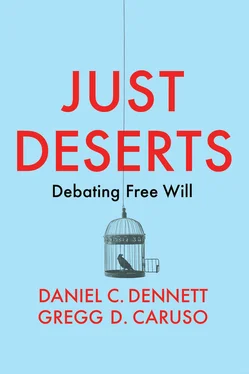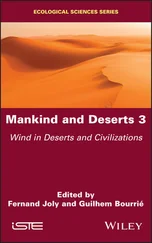Daniel C. Dennett - Just Deserts
Здесь есть возможность читать онлайн «Daniel C. Dennett - Just Deserts» — ознакомительный отрывок электронной книги совершенно бесплатно, а после прочтения отрывка купить полную версию. В некоторых случаях можно слушать аудио, скачать через торрент в формате fb2 и присутствует краткое содержание. Жанр: unrecognised, на английском языке. Описание произведения, (предисловие) а так же отзывы посетителей доступны на портале библиотеки ЛибКат.
- Название:Just Deserts
- Автор:
- Жанр:
- Год:неизвестен
- ISBN:нет данных
- Рейтинг книги:3 / 5. Голосов: 1
-
Избранное:Добавить в избранное
- Отзывы:
-
Ваша оценка:
- 60
- 1
- 2
- 3
- 4
- 5
Just Deserts: краткое содержание, описание и аннотация
Предлагаем к чтению аннотацию, описание, краткое содержание или предисловие (зависит от того, что написал сам автор книги «Just Deserts»). Если вы не нашли необходимую информацию о книге — напишите в комментариях, мы постараемся отыскать её.
Just Deserts
truly deserving
Just Deserts
Just Deserts — читать онлайн ознакомительный отрывок
Ниже представлен текст книги, разбитый по страницам. Система сохранения места последней прочитанной страницы, позволяет с удобством читать онлайн бесплатно книгу «Just Deserts», без необходимости каждый раз заново искать на чём Вы остановились. Поставьте закладку, и сможете в любой момент перейти на страницу, на которой закончили чтение.
Интервал:
Закладка:
Finally, I do not agree that rejecting free will and basic-desert moral responsibility will “return humanity to Hobbes’s state of nature where life is nasty, brutish and short.” You write: “If you have some other vision of how a stable, secure, and just state can thrive without appeal to moral responsibility, you owe us the details.” First, let me reiterate that the kind of moral responsibility I reject is basic-desert moral responsibility. Of course, there are other conceptions of moral responsibility that are perfectly consistent with free will skepticism – such as Waller’s notion of take-charge responsibility , the attributability responsibility I referenced in the Einstein example, and Pereboom’s forward-looking notion of responsibility, which focuses on three non-desert-invoking desiderata: future protection, future reconciliation, and future moral formation. Second, I agree that I owe you and others an account of how to maintain a stable, secure, and just society without basic-desert moral responsibility. Fortunately, my good friend Derk Pereboom has already provided most of the details for such an account in his two books Living Without Free Will (2001) and Free Will, Agency, and Meaning in Life (2014). And I have further developed a detailed account of how to address criminal behavior without basic-desert moral responsibility in Rejecting Retributivism: Free Will, Punishment, and Criminal Justice – it’s called the public health–quarantine model . While I wish we could debate the merits of it here, it unfortunately looks like we have run out of time. The details of my account, however, are readily available for anyone who is interested (see, e.g. Caruso 2016a, 2021; Pereboom and Caruso 2018). [Note to reader: We return to these issues, including a discussion of the public health–quarantine model, in our third exchange.]
Coda: On Determinism
Caruso:I would also like to explore further your thoughts on determinism, since thus far we’ve said very little about it. Determinism , as it’s traditionally understood, is the thesis that at any given time only one future is physically possible (van Inwagen 1983: 3). We can say that a world is governed by determinism if and only if, given the way things are at time t , the way things go thereafter is fixed as a matter of natural law (Hoefer 2016). Or put differently, it’s the thesis that facts about the remote past in conjunction with the laws of nature entail that there is only one unique future (McKenna and Pereboom 2016: 19). As a compatibilist , I assume you either accept the thesis of determinism or think it’s no threat to the kind of free will and moral responsibility under dispute.
Earlier, I wrote that, “the particular reasons that move us, along with the psychological predispositions, likes and dislikes, and other constitutive factors that make us who we are, themselves are ultimately the result of factors beyond our control.” In reply, you said, “So what?” You then added that what really matters is autonomy, self-control, and moral competency. Of course, this is the standard compatibilist move. Compatibilists maintain that what is of utmost importance is not the absence of causal determination, but that our actions are voluntary, free from constraint and compulsion, and caused in the appropriate way. Different compatibilist accounts spell out requirements for free will differently but widely endorsed views single out responsiveness to reasons, self-control, or connection of action to what one would reflectively endorse. But before we get into a debate over whether the compatibilist view is capable of preserving free will, I would first like to get clearer on what, exactly, determinism entails with regard to human action and whether you accept those implications.
Do you accept, for instance, that if determinism is true, then all human behavior, like the behavior of all other things in the physical universe, is causally determined by antecedent conditions in accordance with natural laws? Do you also accept that determinism rules out or excludes an agent’s ability to do otherwise in exactly the same set of circumstances? Consider, for example, the following everyday example. This morning, after I showered, I went to my closet, opened it, looked inside, deliberated for a moment (not very long), and then decided that I would wear one of my (many) black button-down collared shirts. If determinism is true, my choice would have been the only one I could have made in exactly that situation , keep everything in the universe exactly the same up until the moment of choice. That is because according to determinism, our choices and actions are the fixed result of a deterministic chain of events that trace back to factors ultimately beyond our control (i.e. events in the remote past and natural laws). Hence, if determinism is true, then for any given voluntary action we would end up with something like the following picture – where a myriad set of antecedent conditions determines our unique set of inner psychological states and processes, which in turn determines our subsequent choice and action.

Figure 1
On this picture, keeping everything in the universe exactly the same up until a particular moment in time, say time t, the agent’s choice would be causally determined such that they could not have done otherwise in exactly those circumstances.
Of course, some compatibilists have argued that terms like can, power , and ability should be given a conditional or hypothetical analysis. These compatibilists maintain that when we say that an agent can (i.e. has the power or ability to) do something, we mean the agent would do it if the agent wanted (desires or chose) to do it. On this approach, to say “you could have done otherwise” would amount to the counterfactual claim that you would have done otherwise, if (contrary to fact) the past (or the laws of nature) had been different in some way. The problem, however, with analyzing I could have done otherwise as I would have done otherwise if I wanted (or chose) to , is that it only invites the obvious question: Do I have the freedom or ability to want (or choose) differently? For the compatibilist argument to work, it would have to show that the ability to want otherwise is itself compatible with determinism, and here the conditional approach will not help without causing a regress. Furthermore, this analysis would still fail to preserve the unconditional ability to do otherwise – hence, agents would still lack the ability to do otherwise in exactly the same set of circumstances keeping the laws of nature and antecedent conditions fixed. It would seem, then, that understanding the “ability to do otherwise” by means of conditional analysis would amount to nothing more than “the little could that would but can’t so won’t.”
Setting aside for the moment the question of whether the “ability to do otherwise” is a necessary condition for free will, and without getting into a compatibilist defense of free will quite yet, I simply want to know whether you agree with my summary of determinism and what it means for human action. Do you accept that if determinism is true, then all human behavior, like the behavior of all other things in the physical universe, is causally determined by antecedent conditions in accordance with natural laws? And do you also accept that determinism rules out or excludes an agent’s ability to do otherwise in the unconditional sense?
Читать дальшеИнтервал:
Закладка:
Похожие книги на «Just Deserts»
Представляем Вашему вниманию похожие книги на «Just Deserts» списком для выбора. Мы отобрали схожую по названию и смыслу литературу в надежде предоставить читателям больше вариантов отыскать новые, интересные, ещё непрочитанные произведения.
Обсуждение, отзывы о книге «Just Deserts» и просто собственные мнения читателей. Оставьте ваши комментарии, напишите, что Вы думаете о произведении, его смысле или главных героях. Укажите что конкретно понравилось, а что нет, и почему Вы так считаете.












